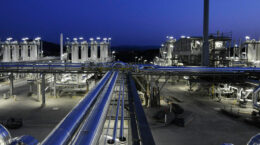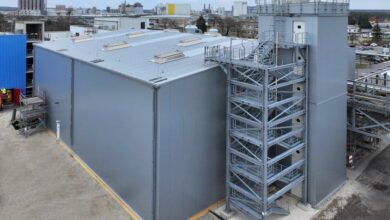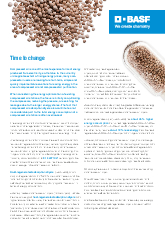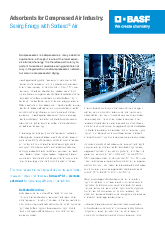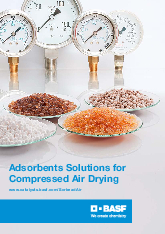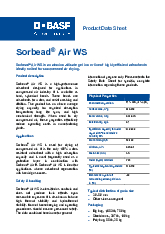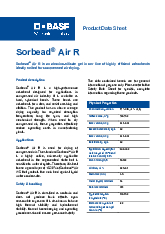Sorbead® Air: The Ideal Adsorbent for Air Drying
Sorbead® Air is known to cut energy and maintenance costs significantly due to many of its properties. It is the best adsorbent to use for the dehydration of air because of its:
Large surface area, which leads to a larger adsorption capacity
- 5% in energy due to high dynamic capacity
Low desorption temperature, which decreases the amount of energy used in regeneration
- 15% in energy due to low desorption temperatures
Long lifetime due to its abrasion resistance and mechanical and thermal stability
- 25% to 40% on refills due to long life span
Ability to achieve low pressure dew points
Sorbead® Air can be used in the most energy efficient, environmentally friendly systems.
| Dryer | Sorbead® Air | Activated Alumina | Molecular Sieve | |
|---|---|---|---|---|
| Economic | ||||
|
Economic
|
✖ | |||
| ✖ | ||||
| Standard | ||||
|
Standard
|
✖ | ✖ | ||
| ✖ | ✖ | ✖ | ||
External heat regenerated (purgeless)
Low-energy external heat-regenerated adsorption dryer which is desorbed and cooled with sucked in ambient air (blower air). An external electric heater, steam or other heat transfer medium is used for heating. This modern purgeless or zero purge system requires no compressed air and depending on the required pressure dew point.
Purgeless
- Desorption in countercurrent to adsorption
- Co-current cooling to adsorption
- No dry compressed air required for cooling,
Pressure dew points: -15 to -60°C
Zero purge
- Desorption in countercurrent to adsorption
- Co-current cooling to adsorption in suction operation
- No dry compressed air required for cooling,
Pressure dew points: -25 to -60°C
Co-Current
- Desorption in Cocurrent to adsorption
- Co-current cooling to adsorption
- No dry compressed air required for cooling,
Pressure dew points: -25 to -40°C
V-Regeneration
- Suction Desorption (Vacuum) in Co-current to adsorption
- Co-current cooling to adsorption
- No dry compressed air required for cooling,
Pressure dew points: -25 to -60°C
Closed Loop
- Desorption in countercurrent to adsorption
- Countercurrent cooling to adsorption in a closed loop with an reheration cooler
- No dry compressed air required for cooling,
Pressure dew points: -25 to -60°C
Heat-of-Compression (HOC)
The Heat-of-Compression dryer is a heat regenerated adsorption dryer which uses the hot compressed air of a compressor (oil free) for desorption in full flow. The closed system is regenerated under pressure and the hot compressed air coming from the compressor is used for desorption.
These systems are among the lowest energy compressed air dryers and show how economically and efficiently dry compressed air can be produced.
In addition to the variant shown above, there are also systems that regenerate in partial flow or systems that use an integrated compressed air aftercooler, so that the compressor is designed as a hot-air version without an aftercooler.
- Desorption in countercurrent to adsorption
- Co-current cooling to adsorption (in full or split stream)
- integrated regeneration combi cooler for cooling the desorption and cooling flow rates
- achievable pressure dew points as a function of compressor temperature (hot air)
- can be used with oil-free piston, screw and turbo compressors
- Possible in case of too low final compressor temperatures or lower dew points in a additional heating process
Pressure dew points: -15 to -40°C
Recommended products:
Sorbead Air WSHeatless
Cold regenerated dryers (heatless) work without heat but with additional compressed air. These pressure swing adsorption dryers require a partial flow of depressurized dry compressed air (15-20%) throughout the cycle for regeneration. The changeover takes place after only a few minutes with low water adsorption of the desiccant of less than 1 wt-%. The high consumption of dry compressed air depending on the operating pressure results in relatively high energy costs during operation.
Pressure dew points: -25 to -40 °C
External heat regenerated (standard)
This system is the basic version of External heat regenerated adsorption dryers and probably the most widely used heat regenerated dryer process. These standard systems are desorbed with External heated blower air and then cooled by a short blower run and a partial flow of dry compressed air.
The consumption of dry compressed air (8-12 %) during the cooling phase and the high desorption temperatures, as well as a sometimes quite high differential pressure in the adsorber bed, its reducing the efficiency of this system enormously.
- dry compressed air is required for cooling (purge)
- short drying times with low reserves (stand-by phase)
Pressure dew points: -25 to -40°C


